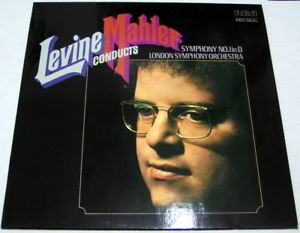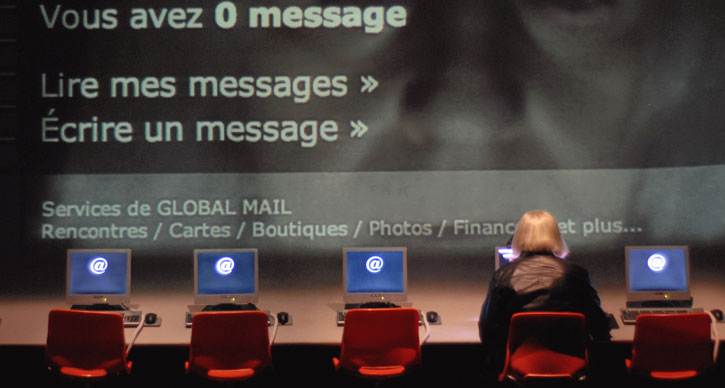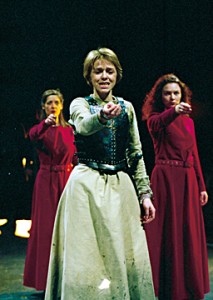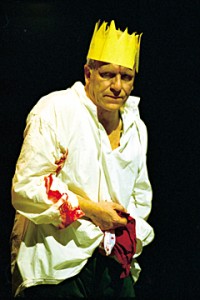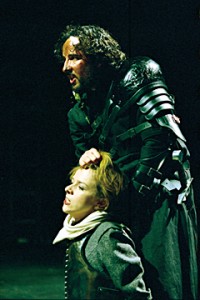2017-18 Season Video
UMS Honored with National Medal of Arts
We are thrilled and honored to announce that the University Musical Society (UMS) has been selected as one of the 2014 recipients of the National Medal of Arts, announced by the White House today. The award will be presented on Thursday, September 10 at 3:45 pm at the White House. Read full press release.
The National Medal of Arts is the highest award given to artists and arts patrons by the United States government. The National Medal of Arts is awarded by the President of the United States to individuals or groups who “are deserving of special recognition by reason of their outstanding contributions to the excellence, growth, support and availability of the arts in the United States.”
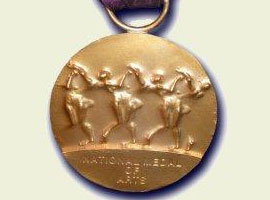 Said UMS president Ken Fischer: “We are simply ecstatic to be selected as a recipient of the National Medal of Arts. For over a century, UMS has had an uncompromising commitment to presenting a diverse roster of legendary artists, to developing students at the University of Michigan and beyond, and to commissioning new work that we hope will influence arts enthusiasts for decades to come. We are proud to join the legion of national arts luminaries who have inspired and served many generations of arts lovers — and we are proud of our community, whose unwavering support for the arts makes this work possible.”
Said UMS president Ken Fischer: “We are simply ecstatic to be selected as a recipient of the National Medal of Arts. For over a century, UMS has had an uncompromising commitment to presenting a diverse roster of legendary artists, to developing students at the University of Michigan and beyond, and to commissioning new work that we hope will influence arts enthusiasts for decades to come. We are proud to join the legion of national arts luminaries who have inspired and served many generations of arts lovers — and we are proud of our community, whose unwavering support for the arts makes this work possible.”
Through an uncompromising commitment to presentation, education, and the creation of new work in the performing arts, the University Musical Society of the University of Michigan (UMS) serves Midwest audiences by bringing to the Ann Arbor campus and Southeast Michigan region an ongoing series of world- class artists, who represent the diverse spectrum of today’s vigorous and exciting worlds of live dance, theater, and music. UMS’s mission is to inspire individuals and enrich communities by connecting audiences and artists in uncommon and engaging experiences. Since its founding 137 years ago, strong leadership, coupled with outstanding venues, authentic artistic and community collaborations, dynamic education programs, and enduring commitment to excellence, has placed UMS in a league of internationally-recognized performing arts presenters.
In addition to UMS, other recipients of the 2014 National Medal of Arts are U-M Emeritus Professor and operatic tenor George Shirley (who has performed under UMS auspices five times since 1973), Meredith Monk (three UMS performances in 2000 and 2012 with the San Francisco Symphony), and Ping Chong (whose theater company performed Edda with Benjamin Bagby in 2001).
Want more award information? The award ceremony will take place next Thursday, September 10, 2015 at 3:45 pm at the White House and will be available via live stream.
Members of the media interested in more information about the program should contact Sara Billmann, UMS Director of Marketing & Communications, at sarabill@umich.edu. Read full press release.
UMS Playlist: Classical Music Old Friends from Communications Director Sara Billmann
This post is a part of a series of playlists curated by UMS staff, artists, and community. Check out more music here.
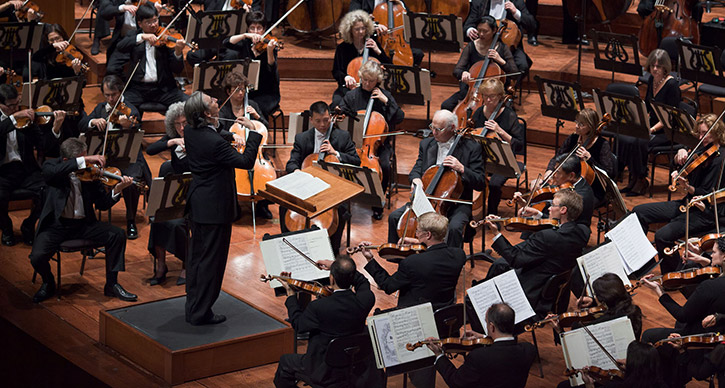
Photo: San Francisco Symphony, who’ll perform Mahler Symphony No. 7 at Hill Auditorium on November 13, 2014.
I grew up in a small town in Wisconsin and studied piano from age 5 and oboe from age 11 in a family where music was central. My mother was a piano teacher, taught vocal music in the public schools, and directed her church choir; my sister became a professional horn player and freelances in New York; and even my father, a middle school math teacher for over 35 years, participated by periodically singing in a local chorus and playing the baritone in a local German band.
Because of that background, I was constantly exposed to classical music, but there are some pieces that stand out as having made an incredible impression on me as a young musician from the time of middle school until early college. While my tastes have certainly evolved over the years, these are still my “old friends” that I love to revisit and never grow tired of.
Mahler’s Symphony No. 1: I fell in love with this piece in 7th or 8th grade and can remember being home alone, turning out all of the lights, and lighting candles to listen to an early James Levine recording in a complete solitude. Mahler could take me to a place of incredible peace, only to be interrupted by the bombastic beginning to the fourth movement, which always scared the bejeezus out of me. To this day, I’m still a pushover for Mahler and the emotional range that his symphonic and vocal works explore.
Bach Brandenburg Concerto No. 2: As an oboe player, I loved playing along with the record of Bach’s Brandenburg Concerto No. 2. It’s such a joyful piece, fun to play, but also fun to listen to. My sister would occasionally play along with me, adapting the trumpet part for horn.
Beethoven Symphony No. 9: I played this work in high school with my local orchestra (with my sister also in the orchestra and my dad in the chorus). Being immersed in the sound of full orchestra plus chorus all on one stage was a remarkable experience for a young musician.
Tchaikovsky’s Capriccio Italien: While seemingly not performed very often these days, this is one of the first classical music pieces that I can remember falling in love with, probably in about 5th or 6th grade. If I remember correctly, we had an LP that included Capriccio Italien, Marche Slave, and 1812 Overture, but it was always Capriccio Italien that I returned to time and again.
Dvorák’s “New World” Symphony: Dvorák’s works are readily accessible and easy to listen to, but certainly not “easy listening.” A recent New York Times article talked about how Dvorák ended up in Iowa, where he wrote this symphony.
Schubert: When I left Wisconsin to move to Ann Arbor to attend the University of Michigan, my sister (then a senior at the University of Wisconsin) made a couple of cassette tapes for me of some of her favorite pieces by Schubert, which I listened to constantly for several years. Among the highlights: Dietrich Fischer-Dieskau singing Die schöne Müllerin, the “Trout” Quintet and the Rondo in D Major for piano duo. Sadly, her tape ran out in the middle of the work, and it was years before I heard how it ended.
Shostakovich: Michael Gowing, the former UMS ticket office manager who retired over a decade ago, considered Shostakovich a “B movie composer,” but I always loved his works. While in college here at U-M, I heard Mariss Jansons conduct the Oslo Philharmonic in Shostakovich’s Symphony No. 7 with its Bolero-like theme, and it was an extraordinary event that began a lifelong appreciation for Shostakovich’s works. I still love listening to the string quartets (especially Nos. 7, 8, and 15), his piano quintet, and many of the symphonies. The Kirov Orchestra’s performance of his Symphony No. 13 several years ago left me in tears, completely shaken at the power of music.
Listen to various selections and recordings of Sara’s picks on Spotify:
What did you think about this playlist? Share your thoughts or song suggestions in the comments below.
5 Things to Know About The Andersen Project
1. Lepage initially created the role that is now performed by Yves Jacques, his “go-to” person for his one-man shows (Jacques was also the actor in Far Side of the Moon in 2005). The play is multi-layered and, like 08/09 Season’s Complicite, enjoyable on many levels – either at the top-level story or digging deeper into the meaning at its core.
2. Jacques plays all three main characters: Frederic, an albino rock lyricist from Montreal who heads to Paris to write the libretto for a children’s opera based on a Hans Christian Andersen story; Arnaud, the opera company’s fast-talking administrator whose personal life is unraveling due to his sexual obsessions; and Rashid, a Moroccan janitor who mops up after clients at a peep show that is located on the first floor of the same building that houses the apartment Frederic is subletting.
3. An example of the multi-layered structure: Lepage was commissioned to write a piece about Andersen to commemorate the 200th anniversary of his birth. His story is about a man who is commissioned to write a libretto for a children’s opera about Andersen. Two of Andersen’s fairy tales are woven into the script. The Dryad is about a tree nymph who sacrifices a long life in the woods for a single day in Paris – a parallel to the librettist, who is seeking artistic validation outside of his own country.
4. Those who have traveled in France will see many connections to what makes the French, well, French. There’s an opening monologue by the opera director, Arnaud, that is breathtaking in its scope and humor – nearly 2,000 words run together in a rambling yet coherent style that only the great storytellers like Spalding Gray or Garrison Keillor can accomplish. The monologue is performed with a strong accent, and every word is not intended to be understood — it’s meant to give a flavor of the character and his obsessive personality.
5. The piece is in both English and French (with supertitles). The constantly shifting projections and stagecraft make the technical aspects of the production at least as fascinating as the story itself.
Ultimately, The Andersen Project is really about an artist searching for validation and fame, unraveling relationships, and dealing with personal demons. The story itself is accessible in that The Andersen Project focuses on larger life issues that virtually everyone deals with at some point and can relate to in multiple ways.
See The Andersen Project March 15-17 at the Power Center.
UMS to Donate Proceeds from Bach Collegium Japan Concert to Earthquake Relief
The University Musical Society will donate 50% of all new ticket purchases to the Bach Collegium Japan concert on Thursday, March 24 in Hill Auditorium to the American Red Cross Japan Earthquake and Pacific Tsunami Relief fund.
Bach Collegium Japan and its conductor Masaaki Suzuki arrived in the United States on Monday for a five-concert tour of Bach’s Mass in b minor, which will be performed in Hill Auditorium on Thursday, March 24 at 8 pm. The group is the third Japanese ensemble presented on the UMS program this season.
Officials from the Bach Collegium Japan identified the American Red Cross as the fund that they would like to support. UMS will track all ticket sales from March 16-24 for the Bach Collegium concert and donate 50% of the ticket price to the American Red Cross Japan Earthquake and Pacific Tsunami Relief fund.
“Our hearts go out to everyone in Japan and locally who is dealing with the aftermath of this terrible tragedy. We have seen first-hand the incredible healing power of music. Nevertheless, we also wanted to do something concrete to signal our support for the many Japanese artists whom we’ve presented over the years,” said UMS President Kenneth C. Fischer.
Masaaki Suzuki, the ensemble’s music director, said, “This has been a very difficult time for my country. We are extraordinarily grateful to all of those in the United States who are offering their support.”
Half of the cost of every ticket purchased between now and the concert on March 24 will automatically be designated for the earthquake relief fund. For further information, contact the UMS Ticket Office at 734-764-2538 or www.ums.org.
This Day in UMS History: Royal Shakespeare Company History Plays (March 10-18, 2001)
Ten years ago today, UMS audiences began a great experiment — the Royal Shakespeare Company presenting four Shakespeare History plays (Henry VI, parts i, ii, and iii, and Richard III) over the course of 27 hours with lunch and dinner breaks built in. The productions, directed by now-RSC artistic director Michael Boyd, marked the beginning of a long relationship between the University of Michigan and Ann Arbor with the RSC. Over the past decade, this partnership has included three major residencies, as well as workshopping new plays on the U-M campus. Each residency was accompanied by dozens of free educational events for students and the public-at-large.
Those who were present will no doubt fondly recall some of these images from the productions:
The three Henry VI plays were presented at 11 am, 2 pm, and 8 pm on a Saturday, with audiences returning on Sunday for the climactic production of Richard III. (There was also one mid-week cycle, which ran Tuesday, Wednesday [both matinee and evening], and Thursday.) Since that season, UMS’s theater programming has expanded significantly, with an annual commitment to presenting both live and high-definition broadcasts of international theater — including this season’s productions of Richard III and The Comedy of Errors by another British theater company, Propeller. Like the RSC, Propeller presents contemporary interpretations of Shakespeare and works with an ensemble cast; unlike the RSC, Propeller uses an all-male cast to present the Bard’s works, as would have been the case in Shakespeare’s day.
Richard III opens at the Power Center on Wednesday, March 30, and The Comedy of Errors opens the following evening. Tickets can be purchased at www.ums.org or by calling 734-764-2538.
VIDEO: Connecting Artists and Kids Through UMS Youth Performances
During a two week period (that began on Friday) UMS hosts five “youth performances” — performances by mainstage artists held during the school day and attended by kids ranging from ages 5-18 from throughout southeastern Michigan. In December, the Carolina Chocolate Drops gave a youth performance to a full house of kids the same day as their sold-out public performance, teaching songs and sounds, as well as performing music. The atmosphere was electric. At the public performance, the CCD talked about how committed they are to providing educational experiences for youngsters and how much they enjoyed performing for the kids earlier in the day. In this video, some students from a local elementary school in Ann Arbor talk about what they enjoyed most about the performance.
Although they only last an hour, these youth performances take literally dozens of people and hundreds of person-hours to pull off. For each performance, UMS creates a “teacher resource guide” that provides background information for teachers, as well as activities they can conduct with students in the classroom. Dozens of Advisory Committee volunteers serve as ushers and provide logistical support for getting all of the students in and out of the venue in a timely fashion. And, of course, backstage the production staff is working with the artists to ensure a top-notch performance. UMS Youth Education Manager Omari Rush is at the center of it all, creating the teacher resource guides, communicating with teachers, ushers, production staff, and following up with those in attendance to ensure an optimal experience.
Recent performances include Brazilian dance, a Native American songwriter, a salsa band, and high school students performing classical music:
Grupo Corpo — Friday, January 21
Joanne Shenandoah — Monday, January 24
Baby Loves Salsa — two performances on Monday, January 31
Sphinx Competition — Friday, February 4
UMS Youth Performances are just one component of a well-rounded youth education program that also includes teacher “cultural literacy” workshops; culture-focused book clubs; day-long intensive “immersions” that focus on a specific culture, community, or art form; and training with education experts provided as part of UMS’s relationship with the Kennedy Center Partners in Education program, which provides educators with arts-infused strategies to enhance student learning across various areas of the curriculum. Click here for complete details on all youth education programs.
VIDEO: UMS President Ken Fischer Receives Top Honor at APAP|NYC 2011 Conference
Kenneth C. Fischer, president of the University Musical Society (UMS) of the University of Michigan, was recognized by his peers at the annual Association of Performing Arts Presenters (APAP) Conference on Monday, January 10 in New York City at APAP’s Annual Awards Ceremony and Luncheon in the Grand Ballroom of the New York Hilton. He received the Fan Taylor Distinguished Service Award, presented each year to an individual whose outstanding service, creative thinking, and leadership have had a significant impact on the profession of presenting and/or on the Association of Performing Arts Presenters. The recipient of the award is kept secret until the annual luncheon at the APAP|NYC conference.
Fischer is currently in his 24th season at the helm of UMS. During that time, he has served on the Arts Presenters’ Board of Directors for two different full terms, including serving as the Board’s Vice Chair. APAP President and CEO Sandra Gibson said, “Ken has been an amazing supporter and colleague, and a tremendous contributor to the field.”
“Oh, man, this is a big surprise,” said an emotional Ken Fischer after being presented with the award and after being informed that his wife Penny, son Matt, daughter-in-law Renee, and grandson Alex were present in the room. “To be receiving an award that’s named after Fan Taylor, who founded this organization [Association of Performing Arts Presenters] is deeply meaningful recognition for me. When I started at UMS, I tried to learn from those who had gone before me — both at UMS and within the field of concert presenting. My faculty became the presenters whom others admire and respect. Rather than give me answers, my colleagues suggested critical questions that I should be asking myself.” After talking about the legacy of long-serving predecessors at UMS (Gail Rector from 1957-1987 and Charlie Sink from 1904-1968) and his mentor, Patrick Hayes, who desegregated the theaters of Washington, D.C., Fischer added two more thank yous: “To the community of Ann Arbor and the University of Michigan, which have provided support for the arts for 131 years. We are so lucky, so blessed with this particular community, which is absolutely extraordinary. And finally, my magnificent staff colleagues.”
The award is named for Fan Taylor, for her many contributions to the field of presenting. Taylor was instrumental in the development of what was then called the Association of College and University Concert Managers, which evolved in Arts Presenters. She served as Arts Presenters’ first secretary-treasurer and eventually its first executive director. She passed away in 2008 at the age of 94. Fischer is not the first UMS employee to receive the Fan Taylor Award, which was first presented in 1972; former executive director Gail Rector received it in 1985.
The event was emceed by actor David Hyde Pierce.
UMS Offers One-Day Sale for Wynton Marsalis Tickets on Weds, Jan 19
UMS jazz lovers are in luck — on Wednesday, January 19, UMS will offer special pricing for Wynton Marsalis’s upcoming concert on Wednesday, February 2 at 8 pm with the Jazz at Lincoln Center Orchestra. The offer is being made to celebrate the designation of Wynton Marsalis — and the entire Marsalis Family — as an NEA Jazz Master.
All remaining main floor seats will be sold for $35, and all mezzanine seats for $25 — a savings of up to 43%!
This year’s concert features music from the Jazz at Lincoln Center’s latest release, Vitoria Suite. Vitoria Suite is a new extended work by Marsalis that uses the impulse of the blues as a foundation to jointly explore the music of two worlds and two cultures: the jazz and blues of North America and the indigenous music of the Basque region and flamenco of Spain. The world-renowned big band also performs original compositions and newly-arranged music of Chick Corea.
To purchase tickets, call or visit the UMS Ticket Office on Wednesday, January 19 at 734-764-2538 (9 am – 5 pm), or order online, using the code word KEYBANK [thanks to KeyBank, our sponsor for this concert!]. Seating is subject to availability.
And if you missed Wynton Marsalis’s interview on 60 Minutes in early January, check it out:
The Four Seasons Like You’ve Never Heard Them Before…
With next Wednesday’s “Seasons Project” featuring the Venice Baroque Orchestra and violinist Robert McDuffie performing both Vivaldi’s Four Seasons and Philip Glass’s “American” Four Seasons in Hill Auditorium, we thought you might enjoy the video trailer for the concert…
…And the opportunity to identify the seasons from Philip Glass’s concerto. Robert McDuffie says, “I specifically asked Philip Glass for four large movements, originally thinking that we would be naming the movements as seasons — until we both disagreed on what was summer and what was winter. He said, this is a great opportunity actually… why don’t we just leave it up to the audience to decide?”
Question of the Month: What Does PLAY Mean to You?
 This season, we’re thinking a lot about “play” and “creativity.” Where is the space for play in our daily lives? What role does play have in the creative and artistic process? What can other professional sectors outside the arts learn from play?
This season, we’re thinking a lot about “play” and “creativity.” Where is the space for play in our daily lives? What role does play have in the creative and artistic process? What can other professional sectors outside the arts learn from play?
Tell us what “play” means to you (you can also tweet #umslobby #play) — and be sure to check out three opportunities to “play” at UMS concerts, with a variety of keyboards available before the concerts and at intermission for audience members at the Mariinsky Orchestra (Sun, Oct 10 at 4 pm in Hill), Takacs Quartet (Thurs, Oct 14 at 8 pm in Rackham), and Vladimir Feltsman (replacing Murray Perahia, Weds, Nov 10 at 8 pm in Hill).
This Day in UMS History: Laurie Anderson Meets the Great White Whale (Sept. 30-Oct. 2, 1999)
 Multi-media dominatrix Laurie Anderson opened the 1999/2000 UMS season with three performances of Songs and Stories from Moby Dick in the Power Center. The piece took Melville’s great novel as its inspiration, with Anderson’s signature penchant for the technological edge highlighted by the debut of the “Talking Stick,” a digital sampling machine that could replicate virtually any sound at a granular level. Anderson’s interest in developing the piece evolved because she was working on a project for high school kids about books with another producer (the project never materialized). She chose Moby Dick, remembering the novel’s obsessive captain, but also remembering, with dread, the incredible detail about the whaling industry and its technical paraphernalia. She was completely captivated by the novel as an adult, read it five times, and began to hear the music and lyricism in the author’s voice. From that experience, she began her largest undertaking in 15 years.
Multi-media dominatrix Laurie Anderson opened the 1999/2000 UMS season with three performances of Songs and Stories from Moby Dick in the Power Center. The piece took Melville’s great novel as its inspiration, with Anderson’s signature penchant for the technological edge highlighted by the debut of the “Talking Stick,” a digital sampling machine that could replicate virtually any sound at a granular level. Anderson’s interest in developing the piece evolved because she was working on a project for high school kids about books with another producer (the project never materialized). She chose Moby Dick, remembering the novel’s obsessive captain, but also remembering, with dread, the incredible detail about the whaling industry and its technical paraphernalia. She was completely captivated by the novel as an adult, read it five times, and began to hear the music and lyricism in the author’s voice. From that experience, she began her largest undertaking in 15 years.
This production was Laurie Anderson’s UMS debut (she has since appeared in 2002 with Happiness and in 2004 with The End of the Moon, and returns in January with Delusion). As a relative newcomer to the staff at that time, I traveled a few months before her Ann Arbor production to see the work in Philadelphia, at the Prince Theater. A night or two before I saw it, the actor playing Captain Ahab miscalculated the edge of the stage and fell into the orchestra pit, breaking his leg. I don’t recall the details of what happened that particular night — I think they canceled the performance — but by the time I arrived in Philadelphia, the actor was back on stage, manipulating his crutches through a surprisingly complicated stage choreography and making it seem as though that had been part of the design from the beginning. It turns out that although Captain Ahab is probably the most famous one-legged captain in literature, Anderson’s team had not considered using crutches until the accident forced the issue. By the time I saw the production in Ann Arbor several months later, the crutches had become an integral prop, perfectly incorporated into the storytelling.
Anderson’s ironic sense of humor permeated Moby Dick. In the program notes for the work, she noted, “Being a somewhat dark person myself, I love the idea that what you look for your whole life will eventually eat you alive.”
This performance brings back so many strong memories for me: how gracious Laurie Anderson was to break from tech rehearsals to give an interview to a public television TV show, how she willingly went to Detroit for a 20-minute interview on WDET, her generosity in allowing selected classes to see a dress rehearsal of the work in tech week. I also remember seeing an internet ticket order come in from somebody who lived in the same small town in Wisconsin where I grew up. This was in the early days of e-commerce, and it was shocking to see an address that was literally down the street from my childhood home, from someone renting an apartment in my late great-uncle’s house. Songs and Stories from Moby Dick was an incredible introduction to Laurie Anderson’s work and an amazing way to kick off the UMS season.
UMS Announces Additions, Changes to 10/11 Season
The 10/11 UMS season opens one month from today with the site-specific theater work Susurrus at the Matthaei Botanical Gardens.
During our summer performance hiatus, we’ve been quite busy at UMS, closing out the 09/10 season and preparing for the 10/11 events. We’ve also been working to add some exciting events to the 10/11 lineup that came together too late for the initial announcement in April:
ASSI EL HELANI, Saturday, November 6 at 8 pm, Hill Auditorium. This Lebanese pop singer has been a major figure in the music scene of the Middle East since the 1990s, participating in numerous important musical events throughout Europe, the Arab World, and America. Also involved in humanitarian concerns, he is one of the true superstars to emerge from Lebanon. Tickets range from $10-$60 with a limited number of $150 VIP seats available.
NATIONAL THEATER LIVE, co-presentation of high-definition broadcasts with the Michigan Theater. Last season, UMS and the Michigan Theater joined forces to present high-definition broadcasts of three plays from the National Theater in London. The series was a big hit with audiences, and we’re delighted to announce an incredible line-up of six productions for the 10/11 season, which includes Complicite’s A Disappearing Number, which UMS brought to Ann Arbor two seasons ago. The titles include:
A Disappearing Number, directed by Simon McBurney in association with Complicite. Sunday, October 31, 2 pm.
Hamlet, directed by Sir Nicholas Hytner with Rory Kinnear in the title role. Sunday, January 2, 2 pm.
FELA! Directed by Bill T. Jones, direct from Broadway. The Tony Award-winning musical about the extravagant, decadent, and rebellious world of Afrobeat legend Fela Anikulapo Kuti explores his controversial life as an artist, political activist and revolutionary musician. Sunday, January 30, 2 pm.
King Lear, directed by Michael Grandage with Derek Jacobi in the title role, in association with the Donmar Warehouse and featuring the creative team behind the company’s recent Broadway hit about Mark Rothko, Red. Sunday, February 20, 7 pm.
Frankenstein, directed by Danny Boyle (Slumdog Millionaire, Trainspotting). Wednesday, April 6, 7 pm.
The Cherry Orchard, directed by Howard Davies and starring Zoë Wanamaker as Madame Ranevskaya. Sunday, July 17, 7 pm.
DATE CHANGES
Mariachi Vargas de Tecalitlán Date Change. To accommodate the addition of Assi El Helani, as well as youth performances for schoolchildren, the date of the public concert for Mariachi Vargas de Tecalitlán has been changed to Friday, November 5 at 8 pm – one day earlier than previously announced.
Kodo Date Change — FAMILY PERFORMANCE ONLY. The FAMILY PERFORMANCE of Kodo will take place on Thursday, February 24 at 11 am, not Wednesday, February 23 as published in the series brochure. The public performance of Kodo will still take place on Wednesday evening as previously announced.
Single ticket brochures will be mailed in about a week (don’t forget – the internet on-sale date is Monday, August 23, with phone and walk-up orders on Wednesday, August 25. Donors of $250+ may purchase beginning Wednesday, August 18!).
31 days to the start of the season…let the countdown begin!
Oysters — The Tudor Version of Cinema Popcorn
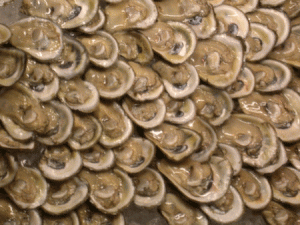 Just came across this interesting article about what theatergoers ate in Elizabethan times, as determined by excavations under the Globe and Rose Theaters.
Just came across this interesting article about what theatergoers ate in Elizabethan times, as determined by excavations under the Globe and Rose Theaters.
Oysters anyone? Sturgeon? How about an elderberry pie?
What’s the most unusual concessions fare you’ve eaten at the theater?
The Hill Auditorium Organ
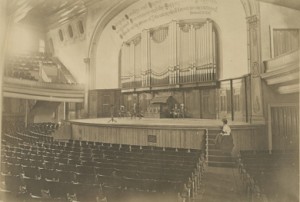 Michigan Today has a great feature on the pipe organ in Hill Auditorium (shown at left in its original Ann Arbor home in University Hall, courtesy of the Bentley Library).
Michigan Today has a great feature on the pipe organ in Hill Auditorium (shown at left in its original Ann Arbor home in University Hall, courtesy of the Bentley Library).
Did you know that the organ was manufactured by a Detroit company for the World’s Columbian Exposition in Chicago (1893)? Or that it contained 3,901 pipe ranging in size from a drinking straw to a tree trunk when it was first built?
Henry Simmons Frieze, the founder of UMS, a professor of Latin, a three-time president of the University of Michigan, and an amateur organist, was the biggest advocate for the acquisition of a world-class organ. He died before his dream was realized, but Albert Stanley and Francis Kelsey launched a public fundraising campaign that brought the organ to Ann Arbor, where it was named in honor of Henry Simmons Frieze.
Read more about the fascinating history of this beloved instrument. And tell us about your experiences with and memories of the Hill Auditorium organ in the comments area below.
More from Alex Ross…Let the Applause Be Heard
 In March, Alex Ross gave a lecture at the Royal Philharmonic Society in London about the seemingly age-old tradition of not applauding during classical music (as a tradition, it actually dates back less than 100 years, and was controversial even when it first started appearing with some regularity). London’s Guardian excerpted his talk (which can also be found in its lengthier version here).
In March, Alex Ross gave a lecture at the Royal Philharmonic Society in London about the seemingly age-old tradition of not applauding during classical music (as a tradition, it actually dates back less than 100 years, and was controversial even when it first started appearing with some regularity). London’s Guardian excerpted his talk (which can also be found in its lengthier version here).
What do you think of the practice? Or of Ross’s other observations about what he refers to as “the other tics of concert life”?
Let the debate begin!


